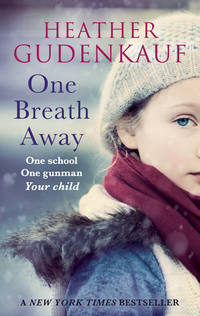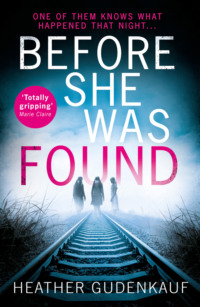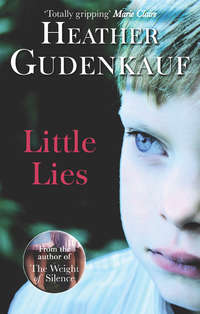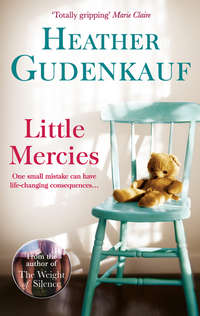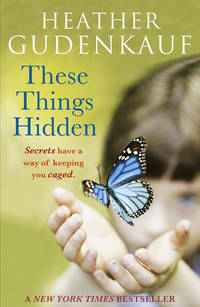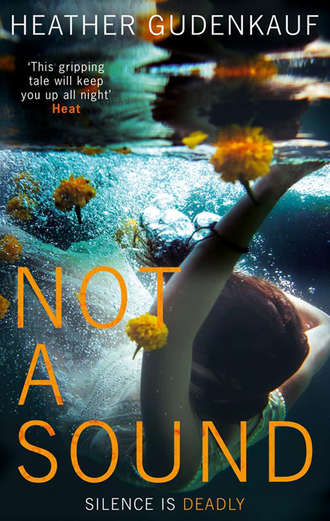
Полная версия
Not A Sound
“Could belong to anyone,” I read his lips, but the crease in his forehead lets me know he’s not so sure. “We’ll tag it just in case.” I nod and move out of the way so that he can make his phone call.
There has to be a logical explanation as to why a running shoe has been abandoned in the weeds, though nothing I come up with makes much sense. An involuntary shiver runs through me. Gwen was a serious runner. Could the shoe belong to her?
My neighbor approaches. He’s tall, about six feet, and I have to tilt my head back to get a good look at his sharply planed face. “Evan Okada,” he says, holding out his hand. “...live next door... I wish...meeting under better...”
“Amelia Winn,” I say and take his hand. His fingers wrap around mine—a warm cocoon.
Evan goes on to speak and from what I can decipher and from the wary look on his face he is telling me that he’s tried to stop over to my house but the dog runs him off.
“Really?” I ask as if dumbfounded. “He’s normally so friendly.” In reality, when Stitch alerts me that someone is at the door I pretend to not be home or if I see my neighbor walking down the path from his house toward mine I let Stitch out the back door with the order to stekje and scok—to jump and bark, sending Evan scurrying back to the top of the bluff. My little revenge for all the unwanted foot and river traffic his business has brought to my backyard.
He turns away from me and gestures toward the trail. I have no idea what he’s saying and I should probably tell him that I can’t hear but I don’t particularly want to share any personal information with him. Though I’m fully capable of taking care of myself, I don’t advertise that I’m a single woman living all alone. My ex, David, used to say that I have a thin layer of ice encasing my heart that makes it hard for people to get to know me and that the warm temperature in the room when we first met must have melted it enough for him to be able to wriggle his way in. I would laugh, because it was true. Ever since my mom passed away when I was thirteen, I’ve been guarded, cautious of getting close to others. When David came along I let him in, let myself trust him. Now, once again, the thin layer of ice has thickened and has developed a bad case of freezer burn.
Thankfully, the officer has finished his phone call and though Evan is still chattering away I take the opportunity to extract myself from his side.
“Can I head on home?” I ask the officer. “It’s not far, just down this side of the ridge. I really need to get home,” I say. “I have an appointment that I’m already late for.” He hesitates and I know he’s grappling between following the order that he was given to make sure Evan and I get home safely and securing what could be a new part of the crime scene after Stitch unearthed the woman’s shoe. “Please,” I add. “Officer Snell has all my contact information. And I’m freezing,” I add for good measure. The officer reluctantly nods.
Without meeting Evan’s eyes, I lift my hand in farewell and make a wide berth around where the shoe lies atop a pile of jewel-toned leaves. I climb back on the ATV and summon Stitch to join me. I turn the key and make sure the engine stop switch is in the run position, engage the clutch and start the engine. The scent of diesel fuel assaults my nose. Slowly, we begin the descent down the bluff.
I have no idea if the officer has allowed Evan to leave too and I don’t look behind me to check to see if he’s following on his ATV. Periodically, Stitch lays his chin on my shoulder, his silver eyes imploring me to let him run ahead. “Zustan,” I say. Stay. The trip down the bluff goes more slowly than the first half. The rocky trail tapers and is so steep in spots that I’m afraid that the four-wheeler might tip over. If I didn’t have my board and paddle strapped to it, I would abandon the ATV altogether and walk the rest of the way. Though I’m glad to be rid of the officer and Evan, I find that I’m feeling a little bit exposed and vulnerable. Without my hearing, I have to rely on my vision to gauge the world around me.
I have to so fully concentrate on maneuvering down the trail in front of me that I can’t be as cognizant of my surroundings as I usually am. I have no idea if someone is hiding in the woods, watching and waiting. Every shadow, each sway of a tree branch seems ominous.
I mentally scold myself. I’m sure I’m perfectly safe. As an emergency room and sexual assault nurse examiner or SANE I know more than most people; I know that assaults are much more likely to be committed by an assailant familiar to the victim. But something nags at me. I’ve worked enough domestic assaults to know that most violence occurs in the home—not in a remote, wooded location. Could Gwen and Marty have been hiking the trails, gotten into an argument that escalated, resulting in her death? But that would mean that Marty would have removed her clothing and deposited her in the river to cover his tracks, destroying any evidence that might lead back to him. I only met Marty a few times, but he seemed like such a nice guy. I just don’t see it.
It’s unnerving to know that a murderer may have recently been walking this very trail. I release my right hand from the steering wheel and reach behind me to rub Stitch’s head. He’s accepted his plight in having to remain on the four-wheeler and is contentedly surveying his surroundings. I know that he will immediately alert me if something’s not right.
Finally, we reach the base of the trail and I can see my A-frame through the trees and much to Stitch’s delight I release him and he darts toward the house. Right now I’m living in a house that belongs to my dad. It’s just a simple fishing cabin where we would spend summer weekends when Andrew and I were kids. For now, this is the perfect place for me. The remote location keeps me out of the bars, the dozens of windows let the light in and the river is just yards from my door.
I drive past three police cars and Jake’s unmarked vehicle that are parked along the gravel road that runs right up to my driveway. I stop the four-wheeler next to my storage shed. I don’t have a garage, just a covered car park where I keep my old Jeep. It’s one of the few things I came into my marriage with that was completely my own and one of the few I left with. I thumb into place the correct numbers on the padlock in order to unlock the door to the shed, unload my board and paddle and set them inside next to my kayak, cross-country skies and snowshoes.
I drive the four-wheeler to where Evan has constructed a garage-like structure from log-cabin wood. This is where he stores his four-wheelers, canoes, kayaks, life jackets and other outdoor gear. I know this because all summer I’ve seen the wannabe outdoorsmen and women emerge from behind the hewn logs with all manner of outdoor gear. They are dressed in their two-hundred-dollar hiking boots, neoprene bodysuits and GoPro cameras.
The garage is locked up tight so I leave the four-wheeler where I’ll at least be able to keep an eye on it from my house. I may not want to be in a coffee klatch with my neighbor but I also don’t want to be the one who let his four-wheeler get stolen.
I trudge back to my house, about a football field away. My muscles feel heavy and achy. I’m chilled through and all I want to do is take a hot shower and curl up on the couch with Stitch and a cup of coffee. I kick off my water shoes, unlock the front door and call to Stitch. “Ke mne!” Stitch comes to my side as I open the door, waiting for me to enter first.
I refill Stitch’s water dish that I keep in the tiny laundry room right next to my stacked washer and dryer, peel off my damp clothes and drop them to the floor and push open the door that leads to the only bathroom in the house. If I end up getting this job, if I still have a chance considering I missed the interview, the first thing I’m going to do is gut this area so that I can have the biggest, most luxurious bathtub I can find. Right now all I have is a primitive shower, and no matter how much I bleach and scrub it, the mold and mildew always return, creeping ominously up the walls. I turn the water to full throttle and step beneath the showerhead, letting hot spray wash away the mud and dirt and the chill of my morning trek.
As my sore muscles relax under the stream of water I think back to the crime scene. I know that the police will probably want to interview me again about what I saw. Did I mention the beer bottle? I don’t think I did. I know I didn’t say anything about the extra set of footprints in the mud. Even though it will probably amount to nothing I should have mentioned it. The killer could have brought her through the thicket of prickly brambles, forced her over the piles of fallen timber. He could even have deposited her in the river somewhere upstream and she floated to the spot where I found her. None of these scenarios quite add up for me. Though Gwen was mostly submerged, the parts of her that were exposed—her face, her breasts, her feet, were remarkably unscathed.
What did that mean? That she came willingly with him and he killed her on the scene? That would make most sense if they had been a couple that had been hiking. But wouldn’t there be another set of footprints? Surely there would be signs of some sort of struggle.
Unlike most showers, the water in mine doesn’t gradually grow colder to let you know that the water heater isn’t keeping up. Instead, it goes from scalding, which is how I like it, to frigid. Usually I have it timed perfectly so I exit the shower before the water turns to ice, but today I am so deep in my thoughts about my discovery, I lose track of time and the icy water pours over me in full force.
I slap the handle down and the flow stops. I step from the shower dripping wet, grab a towel from the dryer and wrap it round my midsection, then scurry up the steps to my bedroom that takes up the entirety of the second-floor loft. Teeth chattering, I stand in front of my open closet door where my interview outfit, still swathed in dry cleaner’s plastic, hangs.
I reach into the closet past my interview outfit, hoping that I’ll still get a chance to wear it, and snag a sweatshirt and a pair of jeans from the top shelf. I hastily dress, and as I blow-dry my hair I run my fingers over the thick scar, courteous of my hit-and-run driver, that runs nearly ear-to-ear just above the base of my skull. My hair still won’t grow there but I’m able to cover it by keeping the top layers long.
Through my glass door I see that the dark clouds are swelling and heavy with moisture. It looks like the kids of Mathias will be trick-or-treating carrying umbrellas and wearing rain gear over their costumes. Not that I’m going to have any trick-or-treaters knocking on my door tonight. It’s too rural, too remote out here. But I still put together a goodie bag and a few extra candy bars just in case David decides to bring Nora over so I can see her in her costume. I even slapped some of those window cling-on Halloween decorations in the shapes of ghosts and cobwebs and bats on my sliding glass door in a weak attempt to be festive.
Jake has a fit about my sliding door every time he comes to visit me. “Any half brain can break into one of these. It’s a burglar’s wet dream,” he says. Soon after I moved in he brought me a broom with the bristles chopped off. “See, it fits perfectly,” he said, laying the long, slender wooden handle in the metal track. “Unless an intruder breaks the glass, there’s no way anyone is getting through this door. Promise me you’ll put this in whenever you’re home.”
I promised, and have used the broom handle precisely zero times since. I insert the rod and tell myself that I’m doing so because Jake will most surely drop by later and give me hell if the door is not secured, but in actuality I’m spooked.
Once I’m sure that the dead bolt on the front door and each window is locked I sit down at my C-shaped kitchen counter that serves as my dining table and office area. Sitting on the Formica—a dated beige with a pale blue and brown boomerang pattern smattered throughout—is my laptop and phone. The captioned phone, a gift from my dad, allows me to have real-time phone conversations with others even though I can’t really hear a word they are saying. The system scrolls the caller’s words across the screen so I can see what is being said and I can answer as I always have when using a phone. It even translates into text any voice mail messages left when I’m away. Most of the time the phone sits idle except for my conversations with Nora, and my weekly calls with my dad and brother.
I have two pressing phone calls that I need to make. The first to the center in hopes of rescheduling my interview, and then I need to call David. I’m not sure which call I dread the most. I find the number for the center, and after a few seconds the screen on the tabletop phone display reads “Five Mines Regional Cancer Center, this is Lori, how may I assist you?”
I take a deep breath. Though it’s hard to explain, the anxiousness I feel when I speak into the receiver rivals that of having to sleep in a dark room. “Yes, hello,” I begin, concentrating on modulating the volume of my voice and the enunciation of my words. “May I speak with Dr. Huntley?” Because I can’t hear myself I don’t know how loudly or softly I’m speaking. Usually I rely on clues from the facial expressions of the listener—like if they lean in to hear me better or if they cringe because I’m too loud for the situation. Talking by phone takes away those physical cues, making it impossible for me to know how I’m doing.
“Dr. Huntley isn’t available right now. May I direct you to his voice mail?” the receptionist asks. My shoulders sag. I was hoping to speak to him in person. I want him to know just how much I want this job—how much I need this job. I agree and thank the receptionist, and after a minute the phone display invites me to leave a message for Dr. Huntley.
“Dr. Huntley, this is Amelia Winn. I’m so sorry about missing this morning’s interview. I promise you it was for a very good reason and I’d really appreciate the opportunity to explain everything to you and hopefully reschedule our visit. Thank you. I look forward to hearing from you.”
I leave my phone number, hang up and stare at the phone for several moments before I pick up the receiver again. I dial the number I know by heart. The number that once belonged to me too. This is the phone call I’m hoping will go straight to voice mail. There’s a good chance that David is at the hospital but it could also be a day off for him. I’m not privy to his schedule anymore.
“Hello,” the display reads and my stomach flip-flops.
“David?” I ask because the phone isn’t able to identify who’s speaking.
“It’s me.” Of course I can’t gauge the emotion in his response but I imagine he’s put on his clinical, slightly patronizing tone that he reserves for interns and people who have pissed him off.
“I can explain,” I begin, but then stop. Will it even matter? Every move I’ve made, every word I’ve uttered in the last two years has been wrong. The display remains idle. I was once able to talk to David about anything. He’s the smartest, most capable man I’ve ever met. He’s an excellent ob-gyn, loved by his patients for his gentle bedside manner and well respected by his peers. But beyond that, what I love most about David is that at his core he’s a good man. He would do anything to protect those he loves and there was a time when I was counted among that very small group.
“I was out paddle boarding this morning and something...” I hesitate. I know I’m not supposed to say anything but it’s hard. David knew Gwen. She was my friend, a floater nurse at both hospitals who surely assisted David one time or another in the delivery room. The tragic irony, given Gwen’s job and the fact that I found her floating in Five Mines, is not lost on me. “Something very bad happened. I couldn’t get away in time for my interview with Dr. Huntley. I promise. I’ve already called the center and left him a message.”
I pause, waiting for David to ask me if I’m okay, if I’ve been injured but no words appear on the screen. He is probably just relieved that I messed up before I even got the job—saves the trouble of Dr. Huntley having to fire me later and saves David some embarrassment. I ignore the twinge of hurt and plunge forward, determined to at least get my side of the story out. “I can’t say anymore right now, David. It’s a police matter.”
“Fine, then.” The words finally appear on the display. “I hope you get a second chance.”
“Me too,” I answer, and I think we both know I’m talking about much more than a chance at a clerical job. “How’s Nora?” I ask.
“She’s great.” I imagine his voice rising with pride. “Parent-teacher conferences are next week. She can’t wait to show off her classroom,” he goes on to say. I want so badly to ask if I can come too. After all, for most of Nora’s almost eight years, I was the one who organized and coordinated nearly every single event of her young life. I was the one who took Nora to her first day of kindergarten when David was stuck in a difficult delivery. I was the one who organized her birthday celebrations, baked each cake, wrapped each gift. I read her books before bed each night, put cartoon Band-Aids on her cuts and scrapes, held her when she woke up shaking from bad dreams. Of course I did. I’m her mother.
David doesn’t invite me to teacher conferences any longer and I don’t dare push it. I don’t have any rights when it comes to Nora. Her birth mother, selfish, flighty and indifferent to her daughter, refused to give up parental rights even though David begged her to so that I could adopt her as my own and give Nora a real mother. But that’s just how Trista is. She doesn’t want the inconvenience of having a daughter but to be spiteful she says no to the one person who was thrilled to step into that role.
David, to his credit, after I promised him I had stopped drinking, has grudgingly allowed me to spend some time with Nora. Always in his presence, always in public.
“Can I call her later?” I ask. “I want to hear all about trick-or-treating and her costume.”
“Yeah. How about around eight? We’ll be back home by then.”
“Thank you,” I say, and then as an afterthought, add, “Watch the news tonight, David. It will explain a lot.”
He doesn’t say that he will or won’t, but simply says goodbye and disconnects.
As I heat the kettle for tea, I toss a few pieces of kindling into the wood-burning stove. I have electric heat, but rarely have to turn it on. Twice a year I call an old friend of my dad’s and he brings me enough wood to warm my home through the longest of winters. He stacks it behind the house and even covers it with a tarp to keep it dry. I settle into my mink-brown wide-wale corduroy–covered love seat and without invitation, Stitch squeezes in next to me and lays his whiskered chin on my lap. I leave my steaming mug of tea untouched on the side table next to me. I don’t want to take the chance of spilling the scalding liquid on Stitch’s head. Instead, I run my hand across his flank, my fingers catching on the burrs that have entwined themselves in his coat. Later, I will gently remove each, being extra careful not to yank the hair in the sensitive area around his scar. It wasn’t until Stitch lived with me for a full year before he would fully expose his belly to me.
To the left of me, through another of my many windows, I have a clear line of sight to the four-wheeler I parked outside Evan Okada’s outfitters. He must not have returned yet and I wonder if the officer has found any more articles of clothing that could possibly belong to Gwen.
I don’t worry about missing the phone call from Dr. Huntley. I know the moment it rings, Stitch will alert me, as he has been trained to do. There is a narrow crack in the clouds that I know won’t last long. I close my eyes, and the sun floods through the window so that instead of darkness behind my eyelids I see a warm amber glow and I can sleep.
4
Stitch wakes me with a poke and I immediately sit up and look to the telephone, but see no red flashing light to let me know it’s ringing. Disoriented, I try to get my bearings. In the time I’ve been sleeping the sky has cleared and the sun has lowered but not quite dipped below the horizon, turning the sky a melancholy shade of blue. It must be nearing five o’clock. I’ve been asleep for hours. From the floor Stitch watches expectantly and when he’s sure he has my attention he moves to the back door, and I startle when I see the hulking figure of a man standing there, hands shoved in his pockets. Right away I recognize that it is Jake, still dressed in his suit, and I blush, wondering how long he’s been standing there watching me sleep.
I switch on a lamp, and he smiles smugly at me through the glass as I bend down to remove the wooden rod, then slide open the door. He steps inside, pauses to pet Stitch and slips off his dress shoes, thick with mud.
With a grin, Jake points to me and makes the sign for tired and I self-consciously fluff up my sleep-flattened hair. I don’t know what it is about Jake but somehow I always revert back to that goofy kid who wants to impress her brother’s best friend. He cuffs me on the shoulder and looks me in the eye. “How are you doing, Earhart?” he says, using the nickname he gave me back when I was eight and he was twelve and making the sign for plane crash. A gesture that is strikingly similar to the sign for I love you. I dressed up one Halloween as Amelia Earhart, the famed and ill-fated pilot, and the nickname stuck.
“I’m fine,” I say. “I’m a nurse, Jake, I’ve seen dead people before.”
“Yeah, but they usually don’t pop up when you’re casually paddling by.”
“True,” I admit. “But I really am okay. Were you able to get ahold of Gwen’s husband?” I ask.
Jake’s face sobers and he shakes his head.
“Do you think he did it?” I ask.
“It’s usually the husband. So, yeah, chances are he did it, but we need to gather a hell of a lot more evidence before we settle on him.”
I pick up my now room-temperature cup of tea and move to the sink to dump it out. “Want some coffee or tea?” I ask.
“Anything with caffeine would be great,” he says when I turn back to face him. “I have a feeling I’m going to be up all night with this one.” He follows me to the kitchen area and leans against the counter while I make the coffee.
“Do you think the shoe Stitch found belongs to Gwen?” I ask. I start the coffeemaker, hoping that the answer is no. It’s bad enough knowing that Gwen died just a few miles away from me, but the thought that she might have been on the very trail that runs right up to my front door sends a chill through me. “It’s an odd place to find a shoe,” I say.
“It’s an odd place to find a body,” Jake says.
I tell him about seeing the beer bottle.
“Yeah, we saw that. We’ll see if we can find any fingerprints, but it was probably just left there by some kids.”
“What about footprints?” I ask. “I saw four sets. Mine, the DNR guy’s, Stitch’s paw prints and one more.”
Jake taps the countertop with his fingers. “It was a muddy mess up there. But we tried to get casts of the prints. We’ll see what comes of it. It could mean nothing. I guess whoever did this could have come by a different route.”
I shake my head. “I’ve been through that area a thousand times. It’d be tough to force someone or carry them a different way. It’s pretty rocky and woodsy.”
“What are you thinking?” Jake asks, giving me his full attention. This is another thing I think is both great and confusing about Jake. Every once in a while he forgets that I’m his best friend’s little sister and actually talks to me like I’m an intelligent human being. Other times he dismisses me as if I’m still an annoying kid.
“A motorboat was nearby just before Stitch found Gwen. The wake nearly knocked me off my board. Maybe he brought her there by boat and pushed her overboard there.” This is a terrifying thought. Probably 75 percent of the households in Mathias own some kind of boat, including Jake, David and my neighbor Evan Okada. I rummage through my cupboard in hopes of finding something to offer Jake to eat. I pull down a box of crackers and then go to the refrigerator and find a block of cheddar cheese. “I guess he could have dumped her anywhere and the current brought her to where I found her. Do you have an idea of how she died yet?”


